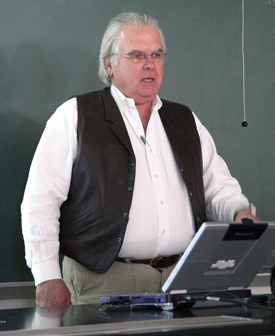The slide show that took a former presidential candidate from a political has-been to an Academy Award, Nobel Peace Prize and international acclaim as the leader of the new environmental movement found its way to Wabash.
On Thursday night Pat Galyan ’72 delivered Vice President Al Gore’s award-winning and famous ‘Inconvenient Truth’ slideshow in Hays Hall room 106. Galyan traveled to Nashville, TN, and was one of 999 people certified to present the slideshow by Al Gore and his staff. Galyan, who works for The Conservation Fund LINK (http://www.conservationfund.org), also delivered a talk earlier that day on efforts to conserve 40 million acres of southwest Alaska from development. The events were sponsored by the Biology Department.
 Galyan’s presentation included not only the slide show of environmental evidence of global warming and its effects on the world but also some personal slides that gave the audience some ideas to combat the problem.
Galyan’s presentation included not only the slide show of environmental evidence of global warming and its effects on the world but also some personal slides that gave the audience some ideas to combat the problem.
Vice President Gore’s slideshow began while he was an undergraduate at Harvard University studying under Dr. Roger Revelle, a pioneer in the study of global warming. Throughout his political career and after the 2000 Presidential election, Gore spent time cultivating datasets, image evidence of global warming and pictorial explanations of the scientific theory. He also proposed government policies that could help curb the effects of global warming.
After he went through Gore’s slideshow, Galyan went through some of his own slides which discussed microcosmic effect on environmental policy, specifically with personal energy use and conservation.
"If you think about your own behavior, Galyan said, "I will guarantee that at some point in your life you plugged your phone in and left it on all night. You left the bathroom light on so you wouldn’t stub your little toe when you get up to go to the potty. This is stuff that we do."
Galyan provided an extensive list of personal conservation tactics from simply turning lights off to supporting policies like a special carbon tax or the concept that organizations and individuals should be financially responsible for pollution they create. He also recommended products and concepts like CFL and LED lights, hybrid vehicles and a paperless lifestyle, which includes reading virtual copies of newspapers, online billing and not using paper dining utensils.
Galyan drew some issue with Wabash’s conservation policies. "I went through this (Hays) building today," he said, "and looked at all the lights on in rooms where no one is in the room. It’s staggering. It’s everywhere you go."
Galyan recommended the campus takes an energy audit, which surveys the amount of energy used by an organization.
Galyan noted his original interest in environmental policy coincided with his arrival at the college.
"When I was at Wabash," he added, "I started the first recycling program for the town of Crawfordsville. Also, as an independent study program I taught ecology in a high school in Indianapolis."
He also noted that his belief in environmental policy was, to a certain extent, a convention of the larger political movement of the time.
"I came to Wabash in 1968 and graduated in ’72," Gaylan said, "and that was the height of the hippie movement in the United States of America. One thing I took away from that hippie movement was the modern environmental movement was started by hippies."
Those in attendance reacted positively to the information presented, but say Gaylan’s presentation as one of advocacy rather than expert analysis.
"I feel like he is more of an advocate than an expert," Wes Harlan’11 said. "I think Wabash should consider some of his ideas, like for example bringing recycling bins on campus."
Galyan is also known for his family’s large chain of sporting goods and outdoor wear. The company was recently sold to Dick’s Sporting Goods.